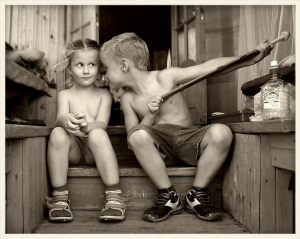Everything in life is cyclical, even romantic relationships. We may have few of these, or many, during our lifetime, but there’s no doubt that they can be our biggest catalysts to growth. Our mates both support and challenge us more than anybody outside of ourselves, such that nobody else knows how to comfort us so capably, yet so effectively push our buttons. Our mates, then, along with our children, are our greatest teachers.
The things that become issues within our relationships tend to be parts of ourselves that we deny we have, and so we project our perceptions onto our partners. What we see in them are simply parts of us we haven’t loved yet, and so whatever karmic lessons we have to learn then become imprinted on our minds as our significant other’s problem. At certain stages of our lives we may try to change that other person, but this is futile, because people just are who they are. It is our imposed perceptions that we have the real problem with, and it’s important to remember that whatever we fail to love in its entirety will come back around, often in a different form or another person, yet with the lessons remaining the same.*
Earliest Relationships Teach Us to Love Ourselves
 We start having romantic-like relationships during our preadolescence. This period is characterized by our simply learning the basics—doing things alone together, kissing, touching and other forms of intimacy, and even fighting and conflict resolution. And, of course, the inevitable…breaking up. Yes we learn very early the lesson of non-permanence. All these aspects of our first romantic relationships are important introductions into the intricacies of love, or infatuation, whatever the case may be.
We start having romantic-like relationships during our preadolescence. This period is characterized by our simply learning the basics—doing things alone together, kissing, touching and other forms of intimacy, and even fighting and conflict resolution. And, of course, the inevitable…breaking up. Yes we learn very early the lesson of non-permanence. All these aspects of our first romantic relationships are important introductions into the intricacies of love, or infatuation, whatever the case may be.
As we get older, then, we take each new relationship into a new level of awareness and understanding. The things that we have learned in previous ones make us a bit savvier for the next, but our earliest relationships are really just platforms for us to learn about ourselves. Let me qualify this statement, because surely we never stop learning, and as I said earlier, our significant others’ tend to be our greatest teachers:
I believe that we do not, and cannot, truly appreciate another person until we appreciate ourselves first. As we move through successive romantic relationships, ideally anyway, we learn to love more about ourselves. My greatest periods of personal growth have resulted from the discomforts of major breakups. Now I certainly realize that this isn’t the case for everybody, but the principle remains the same: Our romantic relationships force us to look at ourselves, and resolve any problems we may have with our own egos.
Thus we may find that some character traits don’t really serve us well—like perhaps pushing aside the things we enjoy or not living within our highest values to accommodate the other person’s values. Or maybe we find that our values aren’t really compatible—that we just want different things in life. This can be a worthy discovery, especially if we come to know our own values better. But we may simply learn about the areas in which we wish to empower ourselves, be it physically, financially, socially, or other. I’ve had every one of these experiences, and depending on your age you may have as well, but there is an even deeper self-understanding that can occur through our love relationships.
Loving Self Opens Doors to Loving Others
As we evolve, we may start to discover things about ourselves that we have always thought were “other-issues,” or at least things we have attracted, but which we come to realize are perceptual constructs that we have about the world in general, and our earliest love interests more specifically. Sigmund Freud called it the Oedipus complex , and Jung added Electra complex to the lexicon, to denote the psycho-sexual development of men and women respectively in relation to their opposite sex parents. I think it’s important to not fixate on the sexual aspect of the theory, and just to consider that our parental relationships affect every romantic relationship thereafter, by being the source of the misperceptions we project onto our mates.
Once we start to see how what we are projecting onto our significant other is really the result of early childhood experiences that have created viewpoints, or emotional charges, and that these have been directing our behaviors and perceptual experiences within our relationships ever since, then we can begin to resolve them, and move closer to transcending these imagined other-issues.
This is a deeper level of self-awareness that comes from being involved in love relationships, and frankly, some people never get there. But if you can, it’s worth the inevitable struggle and pain, particularly when you first make the discovery. The farther you can delve into this fascinating world of self-exploration, the more you will begin to see that your problems with your significant other have not only been cyclical occurrences, but had nothing to do at all with the people you have been involved with. Instead your perceptions are based on childhood events that you initially misperceived to begin with.
And before you think there is no method to the madness, let me assure you that these misperceptions have been necessary to your development and destiny fulfillment. You couldn’t escape them even if you wanted to, as we come into this life with our karmic debt, or necessary lessons to learn. And it wouldn’t have mattered, anyway, who your parents were, or your subsequent love interests, as you would have (and will) project your perceptions onto whomever you decide to get involved with regardless.
True Love
 As you move through this stage of self-awareness, the greater your capacity to truly appreciate your romantic partner becomes—and the closer you get to true love. Because when you can see your partner as a reflection of yourself, you are better able to understand who they actually are, and even what they might be going through at any given time, because they are doing with you exactly the same as you have been doing with them.
As you move through this stage of self-awareness, the greater your capacity to truly appreciate your romantic partner becomes—and the closer you get to true love. Because when you can see your partner as a reflection of yourself, you are better able to understand who they actually are, and even what they might be going through at any given time, because they are doing with you exactly the same as you have been doing with them.
True love constitutes all parts of others and complete experiences—not just the “good” or “pleasureful”, but everything in its entirety. Being able to see that our perceptions are the real determinants in what we consider to be problems is the key to making these quantum transitions. When we enter this phase of self-awareness, our ability to see the love all around us begins to expand, and we can more fully appreciate the person we have chosen to walk through the next leg of our journey with.
Admittedly, not everybody makes it to this stage, and that’s okay—every path is one of learning, which is something none of us can escape. But if you can reach this step, you will surely find your romantic love relationships more rewarding, and the growth within, for the both of you, exponential; you will find that you attract the right partner at the right moment (could be your current spouse, as people can, and often do, grow together) for you to truly experience love in its fullest glory—not just the stuff that makes you feel good, but all of it. And best of all you will come to know yourself more completely, which is the true meaning of life, if you ask me.
~ Dr. Nick Campos June 11, 2012
*If you would love to know how to strengthen your current love relationship or how to attract your perfect mate, I am available for consultations: contact drnick@drnickcampos.com












